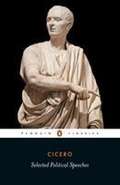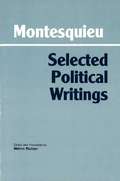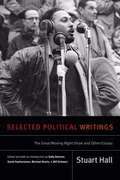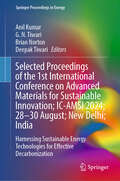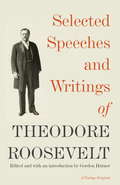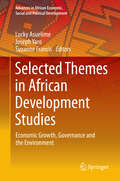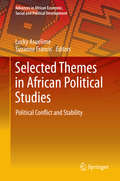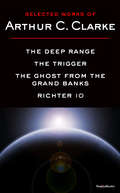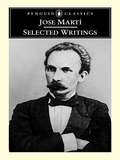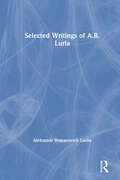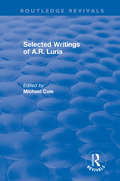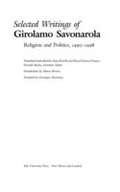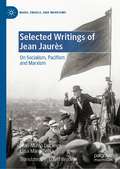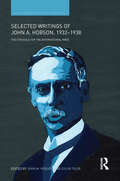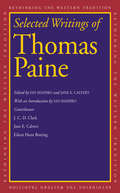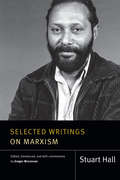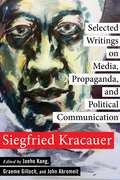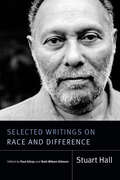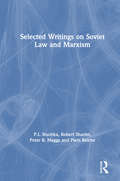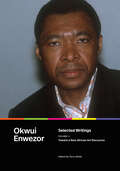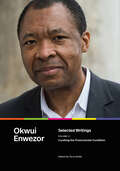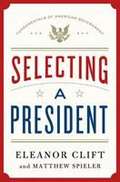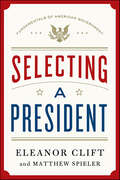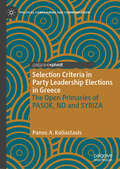- Table View
- List View
Selected Political Speeches of Cicero
by Michael GrantCicero's political speeches remain immensely important for a variety of reasons. They are a mine of information about one of the most significant periods in the history of the world. They are transcripts of the most successful and persuasive oratory ever delivered, belonging to an age when oratory was the major activity of civil life and the nucleus of the educational system. They help to reveal the man who was this preeminent orator and who also played a prominent part in the seething, ominous political scene, a person of extraordinary character whom we are able to get to know intimately. Moreover, his works have continued to exercise a decisive influence on the minds of men throughout the intervening ages.
Selected Political Writings (Hackett Classics)
by Melvin Richter MontesquieuThis volume makes available in modern English the most significant parts of Montesquieu's political, social, and legal theory.
Selected Political Writings: The Great Moving Right Show and Other Essays
by Stuart Hall Bill Schwarz David Featherstone Michael RustinSelected Political Writings gathers Stuart Hall's best-known and most important essays that directly engage with political issues. Written between 1957 and 2011 and appearing in publications such as New Left Review and Marxism Today, these twenty essays span the whole of Hall's career, from his early involvement with the New Left, to his critique of Thatcherism, to his later focus on neoliberalism. Whether addressing economic decline and class struggle, the Cuban Missile Crisis, or the politics of empire, Hall's singular commentary and theorizations make this volume essential for anyone interested in the politics of the last sixty years.
Selected Proceedings of the 1st International Conference on Advanced Materials for Sustainable Innovation; IC-AMSI 2024; 28–30 August; New Delhi; India: Harnessing Sustainable Energy Technologies for Effective Decarbonization (Springer Proceedings in Energy)
by Brian Norton G. N. Tiwari Anil Kumar Deepak TiwariThis book presents peer-reviewed articles from the 1st International Conference on Advanced Materials for Sustainable Innovation (IC-AMSI 2024) held on Aug 28–30 in New Delhi, India. It delves into four key themes shaping the future of sustainable energy as follows: Emerging Technologies for Clean Energy Production: It explores the forefront of renewable energy research. Cutting-edge advancements in renewable sources, energy storage, and smart grids are unveiled, promising enhanced efficiency and sustainability in energy production. Integration of Sustainable Solutions in Energy Systems: Through meticulous analysis, it highlights the seamless incorporation of sustainable technologies into existing energy infrastructures. Emphasis is placed on optimizing energy systems to maximize their impact on decarbonization. Digitalization and Smart Energy Management: It investigates the transformative role of digital technologies, artificial intelligence, and smart energy management. This section illuminates how these innovations revolutionize energy consumption patterns, playing a pivotal role in minimizing carbon footprints. Policy and Regulatory Frameworks for Decarbonization: Readers gain insights into the evolving landscapes of policies and regulatory frameworks that underpin the deployment of sustainable energy technologies. The exploration of these frameworks creates a conducive environment for the effective implementation of decarbonization strategies. &“Innovative Pathways&” offers a multidimensional perspective, uniting technological exploration with strategic insights to guide the future of sustainable energy initiatives.
Selected Speeches and Writings of Theodore Roosevelt
by Theodore Roosevelt Gordon HutnerTheodore Roosevelt (1858-1919) was our most published president with an incredible output of writing including forty books, over a thousand articles, and countless speeches and letters. Collected here in one volume are examples of Roosevelt's voluminous writings over a dazzling array of topics. Organized by general categories, readers can sample writings on subjects as varied as the environment, the danger of professional sports; the famous charge of San Juan Hill, and Roosevelt's passion for literary criticism. From addresses and presidential messages on public policy and national ideals, to biography, to travel writing, to ecological concerns, to writings on hunting, to international politics and history, Roosevelt's talents and achievements as a writer went far beyond what we now expect of our public leaders. Roosevelt's legacy as one of the first progressive American politicians, his concerns about environmentalism, his internationalism, and his unflinching belief in the American character and destiny uncannily speak to the issues of our own day and can be found in the pages of this representative and judicious anthology of his work.
Selected Themes in African Development Studies
by Lucky Asuelime Suzanne Francis Joseph YaroAgainst the background of realities of underdevelopment and economic growth, environmental pressures and global governance challenges, this volume presents a broad picture of contemporary issues in African development. The multi-disciplinary collection presents a variety of important themes, covering land questions, housing, water, health, economic liberalization, climate, environment, and gender. The specific country studies illustrate the diversity of the African continent and demonstrate how unique contexts impact upon different levels of achievement. The volume seeks to present and promote novel analytical frameworks, new conceptual approaches, and empirical accounts of relevance to scholars studying Africa as well as practitioners in African development and policy makers.
Selected Themes in African Political Studies
by Lucky Asuelime Suzanne FrancisAgainst the background of a long and continuing record of political instability in Africa, this edited collection presents a multi-disciplinary approach to selected issues in African political studies. The contributions explore a range of political and conflict situations, discuss efforts to develop indigenous conflict resolution mechanisms and consider some of the key political and economic issues facing the continent. The specific country studies illuminate the diversity of the African continent and indicate the ways in which the political and socio-economic contexts of African states bear directly upon the ability of states to solve political and economic challenges. The volume seeks to present and promote novel analytical frameworks, conceptual approaches and empirical accounts of relevance to scholars working on Africa and to practitioners and policy makers in politics, governance and peace initiatives in Africa.
Selected Works of Arthur C. Clarke: The Deep Range, The Trigger, The Ghost from the Grand Banks, Richter IO
by Arthur C. ClarkeA collection of four unique science fiction novels by the innovative, award-winning author of 2001: A Space Odyssey. This collection not only thrills and excites readers with Clarke&’s passion for science fiction and speculative work, but his words ask readers big questions about what it means to be human, and humanity&’s relationship with nature and technology.The Deep Range: A hundred years into the future, humanity lives mostly on the oceans, tending vast whale herds and plankton farms. Walter Franklin works on a submarine patrol, and his adventures under the sea are told in this riveting tale, set against the backdrop of a world both futuristic and familiar.The Trigger: A team of scientists develops the ultimate passive weapon, a device that detonates all nitrate-based bombs. But even protective weaponry comes with moral dilemmas, and the device&’s inventor struggles to keep the weapon from those with violent intentions.The Ghost from the Grand Banks: An astonishing discovery is made when the two halves of the Titanic are raised from the seabed, six perfectly preserved bodies, including a beautiful woman who was not listed among the ship&’s original passengers. The mission to discover her secret becomes obsessive, and dangerous.Richter 10: A violent earthquake killed Lewis Crane&’s parents when he was just a child. Now grown up, he has devoted his life to protecting humankind from earthquakes. A renowned scientist, Crane has developed technology to fuse the Earth&’s tectonic plates to stop earthquakes forever, but what repercussions will this have on the planet?
Selected Writings
by Esther Allen Roberto Gonzalez Echevarria Jose MartiJosé Martí (1853-1895) is the most renowned political and literary figure in the history of Cuba. A poet, essayist, orator, statesman, abolitionist, and the martyred revolutionary leader of Cuba's fight for independence from Spain, Martí lived in exile in New York for most of his adult life, earning his living as a foreign correspondent. Throughout the 1880s and early 1890s, Martí's were the eyes through which much of Latin America saw the United States. His impassioned, kaleidoscopic evocations of that period in U.S. history, the assassination of James Garfield, the opening of the Brooklyn Bridge, the execution of the Chicago anarchists, the lynching of the Italians in New Orleans, and much more, bring it rushing back to life. Organized chronologically, this collection begins with his early writings, including a thundering account of his political imprisonment in Cuba at age sixteen. The middle section focuses on his journalism, which offers an image of the United States in the nineteenth century, its way of life and system of government, that rivals anything written by de Tocqueville, Dickens, Trollope, or any other European commentator. Including generous selections of his poetry and private notebooks, the book concludes with his astonishing, hallucinatory final masterpiece, "War Diaries", never before translated into English.
Selected Writings of A.R. Luria
by Aleksandr Romanovich LuriiaThis volume contains various articles that are a sample of the ideas constructed and facts collected by Alexander Romanovich Luria during more than half a century of psychological research.
Selected Writings of A.R. Luria (Routledge Revivals)
by Michael ColeFirst Published in 2017. Routledge is an imprint of Taylor & Francis, an Informa company.
Selected Writings of Girolamo Savonarola: Religion and Politics, 1490-1498
by Girolamo Savonarola Anne Borelli Maria Pastore PassaroFive hundred years after his death at the stake, Girolamo Savonarola remains one of the most fascinating figures of the Italian Renaissance. This wide-ranging collection, with an introduction by historian Alison Brown, includes translations of his sermons and treatises on pastoral ministry, prophecy, politics, and moral reform, as well as the correspondence with Alexander VI that led to Savonarola's silencing and excommunication. Also included are first-hand accounts of religio-civic festivities instigated by Savonarola and of his last moments. This collection demonstrates the remarkable extent of Savonarola's contributions to the religious, political, and aesthetic debates of the late fifteenth century.
Selected Writings of Jean Jaurès: On Socialism, Pacifism and Marxism (Marx, Engels, and Marxisms)
by Jean-Numa Ducange Elisa MarcobelliThis book is an anthology of the writings of Jean Jaurès, a central figure of French socialism in the period leading up to World War I, who was born in 1859 and died in 1914, a few days before the outbreak of the conflict. Jaurès is one of the most celebrated politicians in France. His writings in this anthology touch on the subjects dear to him, which are then some of the great political themes of his time. In this book are writings on war and pacifism, on colonialism and anti-colonialism, and on the central themes of socialism of the time, such as reformism and revolution. Despite Jaurès's notoriety in France, he is not well known abroad. This book, a corpus of his emblematic writings, aims, to make Jaurès known to those who do not know him outside of France.
Selected Writings of John A. Hobson 1932-1938: The Struggle for the International Mind (Routledge Studies in Globalisation)
by John M. Hobson Colin TylerJohn A. Hobson is widely recognised as the most important British New Liberal thinker of politics and political economy of the twentieth century. The Selected Writings of John A. Hobson showcases an exciting and previously unpublished collection of Hobson's writings and lectures from 1932-1938 that Hobson presented at the South Place Ethical Society in the last decade of his life. The lectures and the introduction produce a fresh reading of Hobson’s thinking and theorization of International Relations, thereby revealing a much more complex thinker than has conventionally been understood. Edited by Colin Tyler, a framing introduction written by the author’s great grandson, John M. Hobson situates these lectures in the context of his life-work on International Relations between 1897 and 1940. Selected Writings of John A. Hobson 1932-1938 is an essential read for all Hobson scholars and students and scholars of globalization and political economy.
Selected Writings of Thomas Paine
by Thomas Paine Ian Shapiro Jane E. CalvertA central figure in Western history and American political thought, Thomas Paine continues to provoke debate among politicians, activists, and scholars People of all ideological stripes are inspired by his trenchant defense of the rights and good sense of ordinary individuals, and his penetrating critiques of arbitrary power. This volume contains Paine’s explosive Common Sense in its entirety, including the oft-ignored Appendix, as well as selections from his other major writings: The American Crisis, Rights of Man, and The Age of Reason It also contains several of Paine’s shorter essays. All the documents have been transcribed directly from the originals, making this edition the most reliable one available. Essays by Ian Shapiro, Jonathan Clark, Jane Calvert, and Eileen Hunt Botting bring Paine into sharp focus, illuminating his place in the tumultuous decades surrounding the American and French Revolutions and his larger historical legacy.
Selected Writings of Thomas Paine
by Thomas Paine Richard E. RobertsRichard E. Roberts, in the Introduction of this book, explains that Thomas Paine ". . . is the first Revolutionary of them all. Before Washington whispered of independence, Thomas Paine shouted for it. . . in his pamphlet Common Sense. . . . In it, Paine demanded a declaration of independence from England; six months later, our Declaration of Independence was written and signed. Paine had a hand in its writing. Paine could fight as well as write. He joined Washington's army and on a bitter night of retreat, he wrote Crisis 1 on a drumhead by a campfire. . . . Washington had it read to his pitiful army and they turned to whip the British at Trenton. . . . He wrote another Crisis whenever he thought it necessary. He wrote letters to every important man in the country, he reported the progress of the war, he rejoiced at victory. He was the one-man propaganda bureau of the American Revolution . . . he fought battles and wrote what he saw and thought and what his comrades saw and felt. He put into printed words the things they wanted known, he was their voice and their guide. He nourished Liberty with his breath and sweat. In peace, he went to England. There he worked on his iron bridge, his most important invention. He received a patent on it from the government of George III. But Liberty was being born in France, and Paine had to go there. He defended the French Revolution as he had defended the American. He wrote The Rights of Man, an answer to Burke's verbal attacks on the idea of freedom. Paine's logic levelled, if it did not convince, the believers in the divine right of kings. Though Paine hated kings, he loved men, and when a man was no longer a king, Paine could find no enthusiasm for his decapitation. So the French terrorists imprisoned him. Paine wrote The Age of Reason, trying to free men from theocracy and superstition as he had freed them from monarchy and slavishness. . . . Paine returned to the United States on a government ship sent by his friend Jefferson. . . . He had already said that negro slavery was vicious. He wrote of systems of government, the conduct of banks, free men's ways of laying and collecting taxes. He cried for old-age benefits, he pleaded for free education for the poor, he wanted pensions for ex-soldiers. He speculated on the causes of yellow fever, he defended the freedom of the press, he poured a flood of political articles into magazines and newspapers. He died in 1809, not greatly regarded by the new generation who did not know or had forgotten that he helped forge the liberty they enjoyed. Politicians since Paine have charmed their constituents with his words and phrases, they have borrowed his ideas and used them for their own. You will find here words which are the germ of the Monroe Doctrine and others which are the seed, first of the League of Nations, and now the United Nations. Maybe in another two hundred years, we will use the rest of the ideas Paine left us. If we do, he will be happy, he was all his life a lover of Liberty."
Selected Writings on Marxism (Stuart Hall: Selected Writings)
by Stuart HallThroughout his career Stuart Hall engaged with Marxism in varying ways, actively rethinking it to address the political and cultural exigencies of the moment. This collection of Hall's key writings on Marxism surveys the questions central to his interpretations of and investments in Marxist theory and practice. It includes Hall's readings of canonical texts by Marx and Engels, Gramsci, and Althusser; his exchanges with other prominent thinkers about Marxism; his use of Marxist frameworks to theorize specific cultural phenomena and discourses; and some of his later work in which he distanced himself from his earlier attachments to Marxism. In addition, editor Gregor McLennan's introduction and commentary offer in-depth context and fresh interpretations of Hall's thought. Selected Writings on Marxism demonstrates that grasping Hall's complex relationship to Marxism is central to understanding the corpus of his work.
Selected Writings on Media, Propaganda, and Political Communication (New Directions in Critical Theory #80)
by Siegfried KracauerSiegfried Kracauer stands out as one of the most significant theorists and critics of the twentieth century, acclaimed for his analyses of film and popular culture. However, his writing on propaganda and politics has been overshadowed by the works of his contemporaries and colleagues associated with the Frankfurt School.This book brings together a broad selection of Kracauer’s work on media and political communication, much of it previously unavailable in English. It features writings spanning more than two decades, from studies of totalitarian propaganda written in the 1930s to wartime work on Nazi newsreels and anti-Semitism through to examinations of American and Soviet political messaging in the early Cold War period. These varied texts illuminate the interplay among politics, mass culture, and the media, and they encompass Kracauer’s core concerns: the individual and the masses, the conditions of cultural production, and the critique of modernity.The introduction and afterword explore the significance of Kracauer’s contributions to critical theory, film and media studies, and the analysis of political communication both in his era and the present day. At a time when demagoguery and bigotry loom over world politics, Kracauer’s inquiries into topics such as the widespread appeal of fascist propaganda and the relationship of new media forms and technologies to authoritarianism are strikingly relevant.
Selected Writings on Race and Difference (Stuart Hall: Selected Writings)
by Stuart HallIn Selected Writings on Race and Difference, editors Paul Gilroy and Ruth Wilson Gilmore gather more than twenty essays by Stuart Hall that highlight his extensive and groundbreaking engagement with race, representation, identity, difference, and diaspora. Spanning the whole of his career, this collection includes classic theoretical essays such as “The Whites of Their Eyes” (1981) and “Race, the Floating Signifier” (1997). It also features public lectures, political articles, and popular pieces that circulated in periodicals and newspapers, which demonstrate the breadth and depth of Hall's contribution to public discourses of race. Foregrounding how and why the analysis of race and difference should be concrete and not merely descriptive, this collection gives organizers and students of social theory ways to approach the interconnections of race with culture and consciousness, state and society, policing and freedom.
Selected Writings on Soviet Law and Marxism
by Piers Beirne Peter B. Maggs Robert Sharlet P.I. StuchkaThe Latvian-born legal theorist P.I. Stuchka (1865-1932), generally recognized as one of the principal architects of modern Soviet legal theory and the Soviet legal system itself, was a prodigious author and editor. Twenty essays by Stuchka written between 1917 and 1931 were selected for translation
Selected Writings, Volume 1: Toward a New African Art Discourse
by Okwui EnwezorOkwui Enwezor is widely regarded as a leader among the brilliant curators who emerged in the 1990s to set agendas for understanding the global expansiveness of contemporary art. Among his pathfinding exhibitions were the second Johannesburg Biennale (1997), the paradigm-shifting Documenta11 (2002), Archive Fever (2008), and Postwar (2016). In addition to breaking ground as a curator, Enwezor was also a prolific critic, essayist, and theorist. Selected Writings—a landmark two-volume set—brings together Enwezor’s most influential and foundational works. Spanning a quarter-century, these selections reflect the depth and breadth of Enwezor’s writing and its role in his tireless efforts to decolonize the art world. Volume 1, Toward a New African Art Discourse, includes fifteen essays written between 1994 and 2006. Drawn from exhibition catalogs, art journals, interviews with artists, art reviews, curatorial statements, historical studies, and book chapters, these texts show him striving to fulfil the first main ambition that drove his career: to found and sustain what he called a “New African Art Discourse.” Demonstrating that his writing helped fulfill this goal, this collection reaffirms Enwezor’s status as a transformational figure in the global contemporary art world.
Selected Writings, Volume 2: Curating the Postcolonial Condition, Volume 2
by Okwui EnwezorOkwui Enwezor is widely regarded as a leader among the brilliant curators who emerged in the 1990s to set agendas for understanding the global expansiveness of contemporary art. Among his pathfinding exhibitions were the second Johannesburg Biennale (1997), the paradigm-shifting Documenta 11 (2002), Archive Fever (2008), and Postwar (2016). In addition to breaking ground as a curator, Enwezor was also a prolific critic, essayist, and theorist. Selected Writings—a landmark two-volume set—brings together Enwezor’s most influential and foundational works. Spanning a quarter-century, these selections reflect the depth and breadth of Enwezor’s writing and its role in his tireless efforts to decolonize the art world. Volume 2, Curating the Postcolonial Condition, includes seventeen essays written between 2006 and 2019. Drawn from exhibition catalogs, art journals, interviews with artists, art reviews, curatorial statements, historical studies, and book chapters, these texts show him striving to fulfil the second main ambition that drove his career: enabling a critical, diasporic imagining of postcoloniality that would become pervasive within global art discourse. Demonstrating that his writing helped fulfill this goal, this collection reaffirms Enwezor’s status as a transformational figure in the global contemporary art world.
Selecting A President (Fundamentals Of American Government #1)
by Eleanor Clift Matthew SpielerThe debut of a brand-new civics series for high school seniors and college freshmen, that clearly, concisely and cleverly explains how the United States elects its president Selecting a President explains the nuts and bolts of our presidential electoral system while drawing on rich historical anecdotes from past campaigns. Among the world's many democracies, U.S. presidential elections are unique, where presidential contenders embark on a grueling, spectacular two-year journey that begins in Iowa and New Hampshire, and ends at 1600 Pennsylvania Avenue. Modern presidential campaigns are a marked departure from the process envisioned by America's founders. Yet while they've evolved, many of the basic structures of our original electoral system remain in place—even as presidential elections have moved into the modern era with tools like Twitter and Facebook at their disposal—they must still compete in an election governed by rules and mechanisms conceived in the late eighteenth century. In this book, Clift and Spieler demonstrate that presidential campaigns are exciting, hugely important, disillusioning at times but also inspiring.
Selecting a President (Fundamentals of American Government)
by Eleanor Clift Matthew SpielerThe debut of a brand-new civics series for high school seniors and college freshmen, that clearly, concisely and cleverly explains how the United States elects its presidentSelecting a President explains the nuts and bolts of our presidential electoral system while drawing on rich historical anecdotes from past campaigns. Among the world's many democracies, U.S. presidential elections are unique, where presidential contenders embark on a grueling, spectacular two-year journey that begins in Iowa and New Hampshire, and ends at 1600 Pennsylvania Avenue. Modern presidential campaigns are a marked departure from the process envisioned by America's founders. Yet while they've evolved, many of the basic structures of our original electoral system remain in place—even as presidential elections have moved into the modern era with tools like Twitter and Facebook at their disposal—they must still compete in an election governed by rules and mechanisms conceived in the late eighteenth century. In this book, Clift and Spieler demonstrate that presidential campaigns are exciting, hugely important, disillusioning at times but also inspiring.
Selection Criteria in Party Leadership Elections in Greece: The Open Primaries of PASOK, ND and SYRIZA (Political Campaigning and Communication)
by Panos A. KoliastasisThis book provides an in-depth analysis of the voting criteria of selectors in Greek political parties’ leadership elections, focusing on open and semi-open primaries. It examines seven multi-candidate leadership contests organised by the centre-left PASOK, the centre-right New Democracy, and the radical left SYRIZA during 2007 – 2023, from the theoretical perspective of the Stark model and the three ordered selection criteria. Drawing on polling evidence and interviews with candidates, party officials and their aides, the book argues that the model helps explain the results of Greek parties’ six in seven leadership elections.
